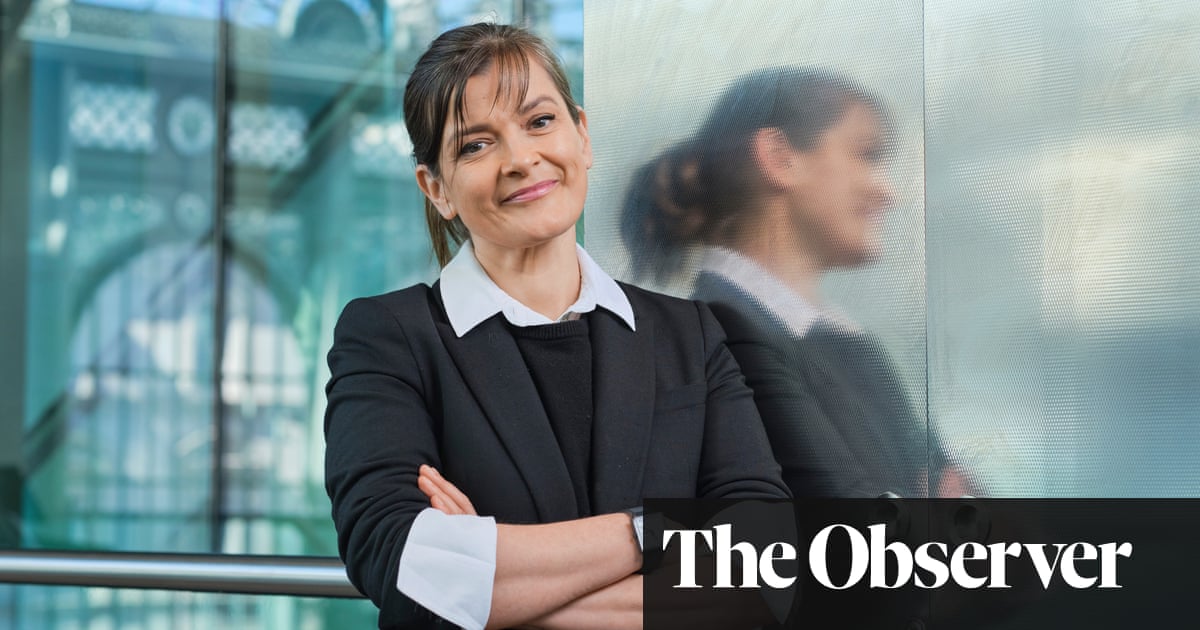Born in London, where she still lives, to an artist mother and musician father, Netia Jones is the new associate director of the Royal Opera. Known for using immersive installations, film and VR, her operas include Alice in Wonderland, Least Like the Other with Brian Irvine, which won the Ivor Novello best opera award, and Peter Grimes, which finished its run last week at the Gothenburg Opera House. Next year she will curate the Royal Ballet and Opera’s first opera and technology festival, RBO/Shift.
The first opera you ever saw, when you were 10, was Peter Grimes. How has it been to revisit the tragic fisherman’s tale?
Relentless! It’s such a brilliant story but so bleak; it gets under your skin. Doing it in Gothenburg, which was cold and very wet, was perfect, although not the best thing for your mental health.
And you were obsessed with it as a child, too?
I was – drawing posters for it for weeks afterwards, and, funnily enough, it was here, at the Royal Opera House. I’ve realised something recently, actually. Kids don’t come to the opera with any preconceptions. I’ve overheard the school matinees here, and the kids go wild. They just erupt. They’re the best events any opera house can do.
Why?
Because when the singers come off stage, they’re so excited. Kids don’t mind about the niceties of when they should applaud or cheer, and I love that, because making opera is a kind of insanity. No one makes money making operas, but hundreds of people come together to make each one anyway, and that’s extraordinary, isn’t it? I think you really feel that something special is happening watching one when you’re young.
Opera is still seen as elitist to many, though. How would you convince someone to try it?
The first thing I’d say is you don’t have to like it. It’s not like it’s really superior. Most of the people that I know are not opera-goers, and they only come along because I drag them along, but they do tend to respond well. Anyway, opera isn’t one thing. It’s disparate – it can be on a small scale, or very technical, or full and lavish, or avant garde and German!
Any tips for nervous opera-goers?
It’s useful to know the story before you come. If you did that with a play or film, it wouldn’t work. In opera, we don’t have spoiler alerts.
You directed the first VR opera, Current, Rising and engage with AI in your work. How would you win over tech-sceptics?
With any technological development, some people will use it to do bad things, some will use it to do good things. That’s got nothing to do with the technology – it’s just how we are as humans. But as artists, we must explore technology in all its guises because we are trained to create rather than to destroy. If you’re coming to technology thinking “What is the most beautiful, poetic, or positive thing we can do with this?”, you think of how it enables all kinds of openings, allows multiple voices and improves access.
Aren’t you scared of AI?
I know AI is the topic of the moment, but it’s not going away. Either you batten down your hatches and the storm rages outside, or you ride the huge wave which is coming. I think it’s better to be riding the wave than being overwhelmed by it. We can’t be blind to the dangers and risks, but the whole AI story isn’t just about worrying if machines are going to create operas or make everybody unemployed. It’s about how we, the humans in the loop, can be enabled to imagine new futures when we’re using it.
It must help your optimism that you work in an environment where people aren’t just stuck behind laptops.
I’ve been lucky enough to work in every single opera-house department, seeing people’s hands in vats dying fabrics, or embroidering, or building sets, or welding. Those jobs will never go away. I don’t believe that opera is going to go away either. It has been with us for 300 years, and it will carry on, because it’s not a medium: it’s an art form. It’s like Janus, the two-headed god, looking back into the past as much as it looks into the future.
You studied modern languages at university. Has that been helpful?
It’s super useful to be able to speak the local language to people in [backstage] workshops. Recently, I learned Swedish for Peter Grimes with an AI buddy, which is so sad. I now have little conversations with my AI Swedish best friend! Speaking other languages is also important post-Brexit, as you can’t be isolationist in opera. Opera, by its very nature, is international, and the best way of making work is to be open to other voices. Think about Mozart. He was travelling around Europe, picking up the best things from all of the countries, including the UK. This melting pot created his amazing work.
You also work outside opera, working in video art and producing performances by artists like gothic singer-songwriter Keeley Forsyth. What do those experiences give you?
Keeley’s phenomenal. Her compositions really draw you into this shattering world of what it is to be human. I spend lots of my time outside opera, anyway – I’m more likely to be listening to Father John Misty than I am to Verdi, to be honest. But to me music is music, and to be able to do different projects concurrently means a great deal to me. It keeps you fresh – plus I don’t see boundaries in my work. We’re so susceptible to putting fences between things as human beings, but you shouldn’t just do one thing with blinkers on for the rest of your life. That exchange with other ideas and other people is everything.
